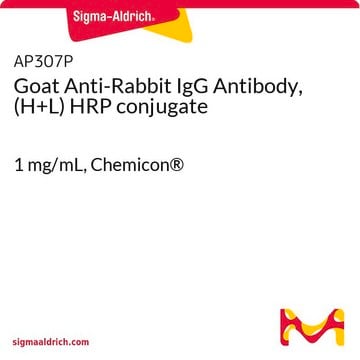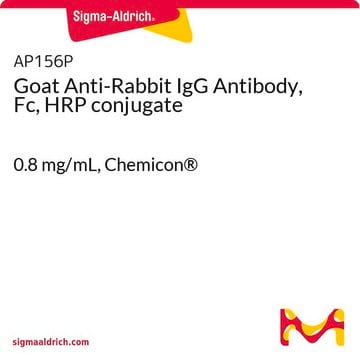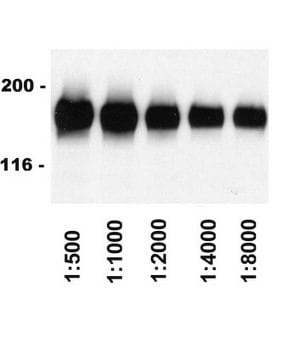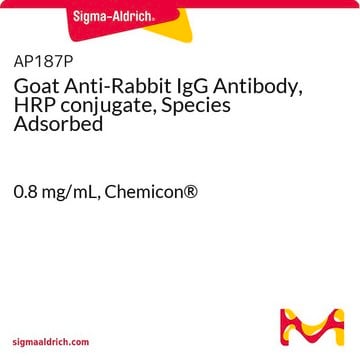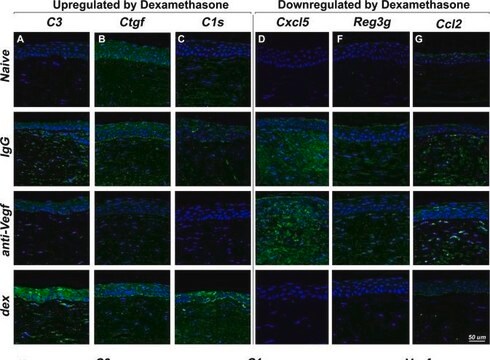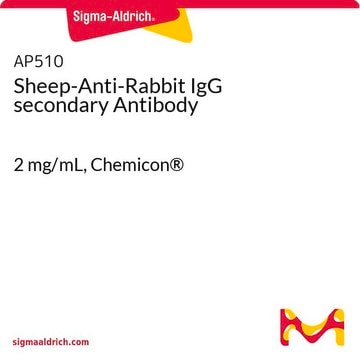AP510P
Sheep Anti-Rabbit IgG Antibody, HRP conjugate
1 mg/mL, Chemicon®
Zaloguj sięWyświetlanie cen organizacyjnych i kontraktowych
About This Item
Kod UNSPSC:
12352203
eCl@ss:
32160702
NACRES:
NA.46
Polecane produkty
pochodzenie biologiczne
sheep
Poziom jakości
białko sprzężone
peroxidase conjugate
forma przeciwciała
purified antibody
rodzaj przeciwciała
secondary antibodies
klon
polyclonal
reaktywność gatunkowa
rabbit
producent / nazwa handlowa
Chemicon®
stężenie
1 mg/mL
metody
western blot: suitable
Warunki transportu
wet ice
docelowa modyfikacja potranslacyjna
unmodified
Opis ogólny
Immunoglobulin G (IgG) is part of the family of glycoprotein immunoglobulins which stage immune responses against pathogenic organisms. IgG contributes to the immune response by mobilizing innate immune effector cells and inducing and pro-inflammatory responses. Such proinflammatory responses are mediated by Fcg receptors which interact with sialylated Fc fragments on IgG molecules. This antibody is processed from Cat. No. AP510, Sheep anti-Rabbit IgG.
Specyficzność
This antibody reacts with rabbit IgG and rabbit IgG (Fc). There may be minimal cross-reactivity against Human IgG and Rabbit IgM, with minimal to no cross-reactivity against Mouse IgG, Rat IgG, Chicken IgY, Guinea Pig IgG, and Hamster IgG.
Zastosowanie
Sheep Anti-Rabbit IgG Antibody, HRP conjugate validated for use in western blotting.
Jakość
Evaluated by Western Blot in Rabbit IgG recombinant protein.
Western Blot Analysis: 0.1 µg/mL of this antibody detected Rabbit IgG in 0.5 µg of Rabbit IgG recombinant protein.
Western Blot Analysis: 0.1 µg/mL of this antibody detected Rabbit IgG in 0.5 µg of Rabbit IgG recombinant protein.
Opis wartości docelowych
~53 kDa observed
Postać fizyczna
Purified sheep polyclonal in buffer containing PBS, StabilZyme® HRP Conjugate Stabilizer, and 0.05% ProClin 150.
Komentarz do analizy
Control
Rabbit IgG recombinant protein
Rabbit IgG recombinant protein
Informacje prawne
CHEMICON is a registered trademark of Merck KGaA, Darmstadt, Germany
StabilZyme is a registered trademark of SurModics, Inc.
This page may contain text that has been machine translated.
Not finding the right product?
Try our Narzędzie selektora produktów.
Hasło ostrzegawcze
Danger
Zwroty wskazujące rodzaj zagrożenia
Zwroty wskazujące środki ostrożności
Klasyfikacja zagrożeń
Aquatic Chronic 3 - Repr. 1A
Klasa zagrożenia wodnego (WGK)
WGK 2
Temperatura zapłonu (°F)
Not applicable
Temperatura zapłonu (°C)
Not applicable
Certyfikaty analizy (CoA)
Poszukaj Certyfikaty analizy (CoA), wpisując numer partii/serii produktów. Numery serii i partii można znaleźć na etykiecie produktu po słowach „seria” lub „partia”.
Masz już ten produkt?
Dokumenty związane z niedawno zakupionymi produktami zostały zamieszczone w Bibliotece dokumentów.
Ryan J Bloom et al.
Nature methods, 11(11), 1147-1153 (2014-09-15)
Synthetic genetic circuits incorporating regulatory components based on RNA interference (RNAi) have been used in a variety of systems. A comprehensive understanding of the parameters that determine the relationship between microRNA (miRNA) and target expression levels is lacking. We describe
Jie Zhou et al.
Cell reports, 38(6), 110344-110344 (2022-01-31)
SARS-CoV-2 has a broad mammalian species tropism infecting humans, cats, dogs, and farmed mink. Since the start of the 2019 pandemic, several reverse zoonotic outbreaks of SARS-CoV-2 have occurred in mink, one of which reinfected humans and caused a cluster
Ecco Staller et al.
The Journal of general virology, 102(9) (2021-09-16)
Viruses require host factors to support their replication, and genetic variation in such factors can affect susceptibility to infectious disease. Influenza virus replication in human cells relies on ANP32 proteins, which are involved in assembly of replication-competent dimeric influenza virus
Bhakti Mistry et al.
Journal of virology, 94(3) (2019-11-07)
The avian-origin influenza A virus polymerase is restricted in human cells. This restriction has been associated with species differences in host factor ANP32A. Avian ANP32A supports the activity of an avian-origin polymerase. However, the avian-origin polymerase is incompatible with human
Chenfei He et al.
Autophagy, 17(11), 3577-3591 (2021-02-05)
Scavenger receptors are pattern recognition receptors that recognize both foreign and self-ligands, and initiate different mechanisms of cellular activation, often as co-receptors. The function of scavenger receptor CD36 in the immune system has mostly been studied in macrophages but it
Nasz zespół naukowców ma doświadczenie we wszystkich obszarach badań, w tym w naukach przyrodniczych, materiałoznawstwie, syntezie chemicznej, chromatografii, analityce i wielu innych dziedzinach.
Skontaktuj się z zespołem ds. pomocy technicznej
